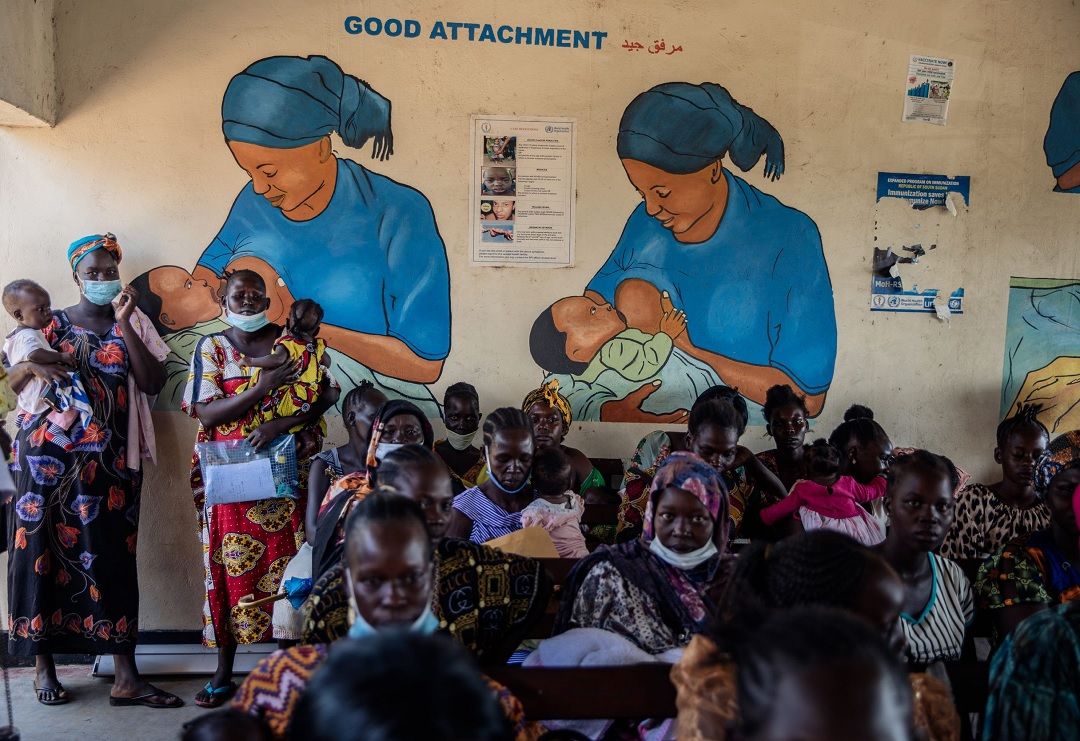Strengthening Health Resilience in Fragile Settings
In May 2020, GOAL and four partner organizations commenced the MOMENTUM Integrated Health Resilience Program (MIHR), in an effort to strengthen health resilience and continue providing high-quality, respectful, maternal, newborn, and child health (MNCH), voluntary family planning (FP), and reproductive health (RH) care in countries affected by conflicts, disasters, and other shocks and stresses.
MIHR is part of MOMENTUM, a broader suite of innovative programs funded by the U.S. Agency for International Development (USAID) to provide more tailored solutions in maternal, reproductive, newborn, and child healthcare that reflect the unique contexts of communities in fragile settings, which often experience disruptions to basic health services and systems. These can range from family planning services and routine immunization to safe deliveries and ensuring adequate health supplies.
Through 2025, MIHR will target up to 34 such countries, with a budget envelope of up to $200 million, working alongside local organizations, governments, and humanitarian and development partners to strengthen health resilience and improve overall maternal, newborn and child health. One of the project’s main strategies is to increase the capacity of partner country institutions and local organizations—including new and underutilized partners—to introduce, deliver, scale up, and sustain MNCH/FP/RH care in the face of crises. The COVID-19 pandemic has illustrated the extreme urgency of strengthening the resilience of health systems.
MIHR in Action
The MIHR consortium includes IMA World Health, JSI Research & Training Institute Inc., Pathfinder International, Cooperative for Assistance and Relief Everywhere Inc. (CARE), and GOAL USA.
MIHR’s specific objectives include:
- Developing Health Resilience to Counter the Effects of Fragility: USAID defines Health Resilience as “the ability of people, households, communities, systems, and countries to mitigate, adapt to, and recover from shocks and stresses, in a manner that reduces acute and chronic vulnerabilities, and facilitates equitable health outcomes.” (USAID).
- Integrating a Lifecycle Approach: This acknowledges that events occurring early in one’s life greatly influence health outcomes later in life. Our lifecycle approach promotes integrated care at all levels, from individual to national-level services, to improve health across the pre-pregnancy, pregnancy, childbirth, postnatal, infancy, childhood, and adolescent life continuum.
- Adapting Programming to Fit the Context: The consortium partners collaborate with global, regional, and local public and private partners to assess the fragility, complexity, and risks of programming contexts and situations. The project then adapts programming based on the needs of a particular country and the specific crisis. Data collection helps to identify any gaps in knowledge and to modify programming as needed.
- Strengthening Local Voices: It is critical to elevate local voices in global discussions. For example, MIHR facilitates the active participation and leadership of local organizations and experts through virtual and in-person meetings,
- Building Social Accountability, Health Equity, and Inclusion: The program emphasizes youth-and gender-equitable program design and monitoring to address social factors that influence the health of women, newborns, children, and families. A holistic approach, including engaging men and boys to promote gender equity, helps reduce disparities and strengthens community-level interventions for all.
GOAL's Role
GOAL’s strong record of innovative approaches to resilience-building, including the Resilience for Social Systems (R4S) Approach and Resilience Framework, were central to the consortium’s strategy and winning bid. GOAL is the lead technical specialist on Health Resilience for MIHR, advising on strategies to ensure the continuity and enhancement of maternal, newborn, and child health, voluntary family planning, and reproductive health care services, and on the design and operation of Early Warning and Response Systems. We also advise, when requested, on Health Accountability, Social and Behavior Change, and Human-centered Design.
We have also led the development of key program guidance and contributed to other tools, measurement frameworks, and approaches. GOAL’s Analysis of Resilience of Communities to Disaster (ARC-D) toolkit has been adopted by MIHR, adapted for Health Resilience in fragile contexts and is being rolled out across the program.

Mothers wait with their children, who will receive the Penta3 and the IPV vaccines at the Gurei primary health facility near Juba, South Sudan.
GOAL is currently engaged in implementing the CORE Workplan, which guides the overall program strategy; the integration of the MIHR approach in the health systems of Niger, South Sudan and Mali; and working with the consortium to identify additional country partnerships.
GOAL’s MIHR team includes a senior Health Resilience expert as Resilience Lead within the MIHR Project Implementation team, and Health Resilience Advisors on the project teams for each country of operation. GOAL also provides a technical backstopping team, including Global Health Advisors, Resilience Technical Advisors, GOAL’s Deputy Director of Program Design and Innovation, Early Warning and Response System specialists, and other technical experts.
